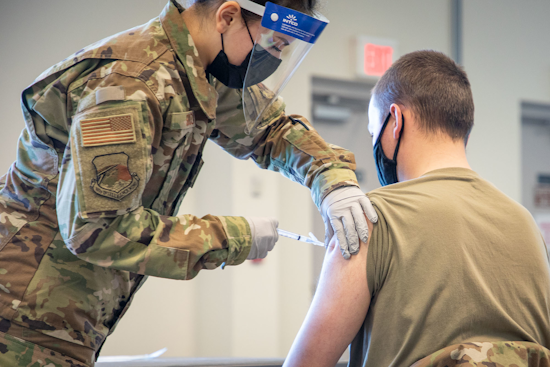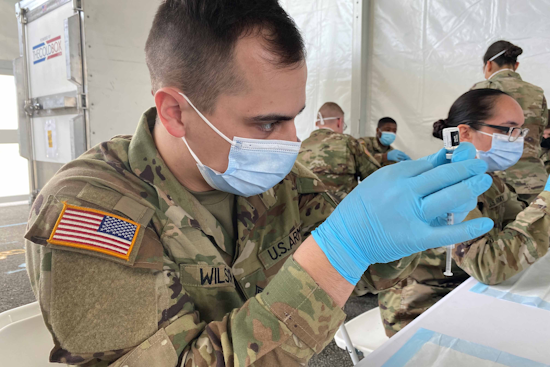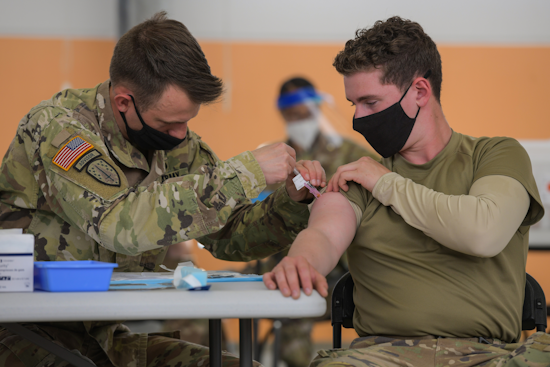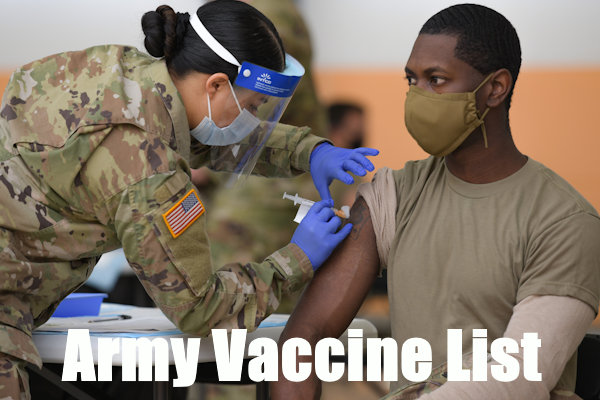The United States Army vaccine list is mandatory for soldiers in most instances.
The service branch mandates certain vaccines due to close living quarters and spending time overseas in foreign lands.
Accordingly, new recruits must understand what types of shots are required for service.
Learn more about the Army vaccine list for 2023, including how to apply for a waiver, below.
Related Article – Military Vaccine List: 18 Shots You Get In Basic Training / Military
Table of Contents
Army Vaccine List for 2023

The U.S. Army makes vaccines mandatory for a reason.
Vaccines are an important preventive factor that protects the health of soldiers and ensures they’ll be ready for service.
Army soldiers often live in close quarters and travel to foreign nations where they may consume contaminated food or water.
Moreover, many dangerous insects (i.e. mosquitos) can cause serious infections or even death.
As a result, the United States Army created a vaccine list for 2023.
The Army vaccine list determines which shots are mandatory, and which vaccines are not.
Currently, the Army vaccine list adheres to the 17 different vaccines required by the Department of Defense (for all military branches), including1:
- Adenovirus Types 4 and 7
- Hepatitis A
- Hepatitis B
- Influenza
- Measles, mumps, rubella
- Meningococcal
- Poliovirus
- Tetanus-Diphtheria
- Varicella
These 9 vaccinations are mandatory for all service members during Army Basic Combat Training.
Army Vaccine List (Health Risk or Military Occupation)
Moreover, in addition to the vaccines required by the DoD Joint Regulation on Immunization and Chemoprophylaxis for the Prevention of Infectious Diseases, other shots may be administered.
These vaccinations are generally administered to military personnel depending on risk and/or occupation:
- Anthrax
- Haemophilus influenzae Type B
- Japanese encephalitis
- Pneumococcal
- Rabies
- Smallpox
- Typhoid fever
- Yellow fever
As such, the U.S. Army vaccine list is comprised of 9 mandatory shots and 8 other potential vaccines (17 total).
Related Article – 85 Countries With Required Military Service
Army Vaccine List Explained

The number of shots new recruits receive at boot camp really all depends on personal health factors and vaccination history.
Therefore, many recruits only need 2-3 shots, especially if they make plans to have those missing from the list administered prior to basic training.
The Army does consider whether the recruit is allergic to any medications (i.e. penicillin).
Furthermore, service members do have the freedom to opt out of mandatory vaccinations based on health, administrative, or religious grounds.
These exemptions may be granted on temporary or permanent status.
Recently, the U.S. Armed Forces rescinded the COVID-19 vaccination requirements, previously required for all soldiers.
Learn more about each vaccine mandated on the Army list for 2023:
#1. Adenovirus (Types 4 and 7)
Adenovirus is a wide assortment of vertebrate illnesses.2
These illnesses range from mild respiratory infections (i.e. common cold) to life-threatening multi-organ diseases in individuals with a weakened immune system.
Consequently, the Army seeks to corral these viruses by mandating a vaccine.
#2. Anthrax
Anthrax was a huge concern post-9/11 after terrorists started using the chemical as a biological threat.3
For this reason, a vaccine exists and remains mandatory “when deployed to an area where an in-theater commander accesses a biological threat.”
In other words, Army personnel likely will not be administered the shot unless deployed to specific regions.
#3. Cholera
The Cholera vaccine is not routinely administered to either active duty or reserve personnel.4
Nonetheless, it may be mandatory depending on the vaccine requirements of certain countries.
As a result, the administration of the vaccine really depends on deployment.
#4. Hepatitis A
Hepatitis A is an infectious disease of the liver and often causes few to no symptoms.5
However, severe symptoms can result in extreme nausea, fever, vomiting, diarrhea, and abdominal pain.
Generally, hepatitis A is spread by eating contaminated food or drinking water.
Thus, the U.S. Army makes the vaccine mandatory “when deploying or traveling to high-risk areas.”
#5. Hepatitis B
Hepatitis B is an infectious disease and is considered more severe than Hepatitis A.6
The virus can lead to both acute and chronic infections.
Furthermore, many people have zero symptoms during the initial infection while the virus spreads rapidly in others.
Hepatitis B is transmitted by exposure to infectious blood or body fluids.
As such, the Army makes the vaccine mandatory for “high-risk occupation groups.”
#6. Influenza (Flu Shot)
Army recruits receive this shot in basic training only during the designated flu season.
Generally, the flu season runs approximately from October to March.
Recently, the United States switched its policy regarding the COVID-19 vaccine, which is no longer required for service.
The flu shot is considered a “routine or booster” shot.
#7. JE Vaccine (Japanese B Encephalitis)
Japanese encephalitis (JE) is an infection of the brain.7
Severe symptoms can result in headaches, fever, vomiting, confusion, and seizures.
The virus is traditionally spread by mosquitoes and transmitted through pigs and wild birds.
However, the vaccine is considered safe and effective and frequently administered in the Asian-Pacific.
Accordingly, Army personnel are required to take the shot when deploying or traveling to “high-risk” areas.
#8. Measles, Mumps, and Rubella (MMR)
Measles, mumps, and rubella (MMR) are administered to all recruits regardless of prior health history.8 9 10
Furthermore, shots for measles, mumps, and rubella are required by many other host nations to enter.
Accordingly, the vaccine is one of the more prominent given to soldiers while many have previously already had the shot.
#9. Meningococcal
The quadrivalent meningococcal vaccine is administered once right before basic training.11
The purpose of the vaccine is to prevent infection while new recruits are living in close quarters and adjusting to military life.
Furthermore, the shot is also administered in other situations where the soldier is deploying or traveling to “high-risk” areas.
#10. Polio
Polio is an example of a horrible, highly infectious disease that has been nearly eradicated thanks to vaccines.12
However, the threat of the disease still exists in certain parts of the world.
Polio doesn’t cause symptoms in some patients and permanent paralysis in others.
Therefore, it’s widely recommended (not to mention mandatory) for Army soldiers.
#11. Rabies
The rabies vaccine is usually administered post-exposure, and it is made available to both military personnel and family members at base hospitals and clinics .13
However, for those in military occupations with a high risk of exposure to animals that may carry the disease, the Army provides Pre-exposure Prophylaxis (PrEP).
For example, animal handlers, veterinarians, security personnel, and those who work in certain laboratories.
Moreover, the vaccine is sometimes required for personnel entering regions where rabies is endemic.
#12. Smallpox
Smallpox, like polio, once wreaked havoc, especially on the young and adults with compromised immune systems.14
However, thanks to vaccines, smallpox has been eradicated (with the hope it remains that way).
Since 1990, only select Army personnel receive the vaccine, a tradition that dates back to George Washington.
In fact, the United States military has a long history of mandating vaccinations.
General Washington was the first to do so when he ordered a mandatory inoculation to protect troops in the Continental Army from smallpox.
Smallpox is estimated to have claimed the lives of 300+ million people in the 20th century.
#13. Tetanus-Diphtheria
The U.S. Army also requires that new recruits have a vaccination history of tetanus-diphtheria.
Accordingly, a primary series of tetanus-diphtheria (Td) shots are initiated for recruits lacking a reliable history of the vaccine.15
Moreover, those with a previous history of Td immunization receive a booster shot.
The booster shot is administered in accordance with ACIP requirements.
#14. Typhoid
Typhoid fever, also known as typhoid, is a disease caused by salmonella exposure.16
The symptoms vary from mild to severe, including the gradual onset of a high fever that lasts several days.
Typhoid is most common in India where poor sanitation and lack of clean drinking water are abundant.
For this reason, the Army makes the shot mandatory for soldiers traveling to certain regions.
#15. Varicella (Chicken Pox)
Chickenpox, formally known as varicella, has largely been eliminated due to vaccines.17
The airborne disease is highly contagious and causes unwanted, nasty side effects.
For this reason, the Army seeks to vaccinate military personnel who may be at risk of exposure.
Additionally, the vaccine is a requirement for personnel entering several other nations.
Related Article – Peanut Butter Shot: 5 Things You Probably Didn’t Know
Frequently Asked Questions (FAQs): Army Vaccine List

Do you have questions or concerns regarding the vaccines necessary for military service?
Here are some frequently asked questions and answers:
Does the U.S. Army require vaccinations?
Yes, the United States Army follows the DoD in mandating 9 different vaccines.
Furthermore, an additional 8 other vaccines may be administered depending on individual risk or regional requirements.
Vaccines protect soldiers who are stationed overseas often in cramped and confined circumstances.
Does the military require the COVID-19 vaccine?
No, not any longer.
Previously, the COVID-19 vaccine was mandatory for service members.
However, that restriction was lifted early in 2023 and is no longer effective.
Can soldiers receive an exemption or waiver for vaccines?
The U.S. Army does consider exemptions for vaccines.
Generally, these waivers are granted based on health, administrative, or religious grounds.
The CDC Adult Vaccine Quiz can help give you an idea of what vaccines you may need to get before Army boot camp.
Vaccinations are offered at most health clinics, doctor’s offices, and pharmacies.
Conclusion
The Army vaccine list mandates certain shots while making others optional depending on assignment.
Generally, soldiers are required to take more shots when they are deployed to foreign locations.
However, infectious diseases can also be spread in close quarters, which is why these shots are required prior to Army boot camp.
Vaccines are considered a safe and effective way to maintain good health and protect soldiers from highly infectious diseases.
Therefore, new recruits can relax knowing their healthcare needs are addressed by the Army on day one of Basic Combat Training with any required immunizations.
References
- Institute of Medicine (US) Committee on a Strategy for Minimizing the Impact of Naturally Occurring Infectious Diseases of Military Importance: Vaccine Issues in the U.S. Military; Lemon SM, Thaul S, Fisseha S, et al., editors. Protecting Our Forces: Improving Vaccine Acquisition and Availability in the U.S. Military. Washington (DC): National Academies Press (US); 2002. 3, Current Status of Vaccines for Military Personnel. (source)
- Doerfler W. Adenoviruses. In: Baron S, editor. Medical Microbiology. 4th edition. Galveston (TX): University of Texas Medical Branch at Galveston; 1996. Chapter 67. (source)
- Chambers J, Yarrarapu SNS, Mathai JK. Anthrax Infection. [Updated 2022 Aug 8]. In: StatPearls [Internet]. Treasure Island (FL): StatPearls Publishing; 2023 Jan-. (source)
-
Collins JP, Ryan ET, Wong KK, et al. Cholera Vaccine: Recommendations of the Advisory Committee on Immunization Practices, 2022. MMWR Recomm Rep. 2022;71(2):1-8. Published 2022 Sep 30. doi:10.15585/mmwr.rr7102a1 (source)
- Herzog C, Van Herck K, Van Damme P. Hepatitis A vaccination and its immunological and epidemiological long-term effects – a review of the evidence. Hum Vaccin Immunother. 2021;17(5):1496-1519. doi:10.1080/21645515.2020.1819742 (source)
- Hodgens A, Marathi R. Hepatitis B Vaccine. [Updated 2023 Mar 24]. In: StatPearls [Internet]. Treasure Island (FL): StatPearls Publishing; 2023 Jan-. (source)
- Simon LV, Sandhu DS, Goyal A, et al. Japanese Encephalitis. [Updated 2022 Aug 29]. In: StatPearls [Internet]. Treasure Island (FL): StatPearls Publishing; 2023 Jan-. (source)
- InformedHealth.org [Internet]. Cologne, Germany: Institute for Quality and Efficiency in Health Care (IQWiG); 2006-. Measles: (source)
- InformedHealth.org [Internet]. Cologne, Germany: Institute for Quality and Efficiency in Health Care (IQWiG); 2006-. Mumps: Overview. [Updated 2020 Nov 5]. (source)
- Camejo Leonor M, Mendez MD. Rubella. [Updated 2023 Jan 31]. In: StatPearls [Internet]. Treasure Island (FL): StatPearls Publishing; 2023 Jan-. (source)
- Reisinger KS, Baxter R, Block SL, Shah J, Bedell L, Dull PM. Quadrivalent meningococcal vaccination of adults: phase III comparison of an investigational conjugate vaccine, MenACWY-CRM, with the licensed vaccine, Menactra. Clin Vaccine Immunol. 2009;16(12):1810-1815. doi:10.1128/CVI.00207-09 (source)
- O’Grady M, Bruner PJ. Polio Vaccine. In: StatPearls. Treasure Island (FL): StatPearls Publishing; January 16, 2023. (source)
- Ertl HCJ. New Rabies Vaccines for Use in Humans. Vaccines (Basel). 2019;7(2):54. Published 2019 Jun 20. doi:10.3390/vaccines7020054 (source)
- Belongia EA, Naleway AL. Smallpox vaccine: the good, the bad, and the ugly. Clin Med Res. 2003;1(2):87-92. doi:10.3121/cmr.1.2.87 (source)
- Mother To Baby | Fact Sheets [Internet]. Brentwood (TN): Organization of Teratology Information Specialists (OTIS); 1994-. Tetanus, Diptheria and Pertussis (Tdap) Vaccine. 2021 Dec. (source)
- Bhandari J, Thada PK, DeVos E. Typhoid Fever. [Updated 2022 Aug 10]. In: StatPearls [Internet]. Treasure Island (FL): StatPearls Publishing; 2023 Jan-. (source)
- Kota V, Grella MJ. Varicella (Chickenpox) Vaccine. [Updated 2023 Jan 30]. In: StatPearls [Internet]. Treasure Island (FL): StatPearls Publishing; 2023 Jan-. (source)
Featured Image Source – www.Army.mil
- Ikon Pass Military Discount: Learn How To Save Big - January 31, 2025
- RTIC Military Discount: Find Out How To Save Big on Gear - January 30, 2025
- Traeger Military Discount: Learn How To Save Big on Smokers - January 28, 2025


